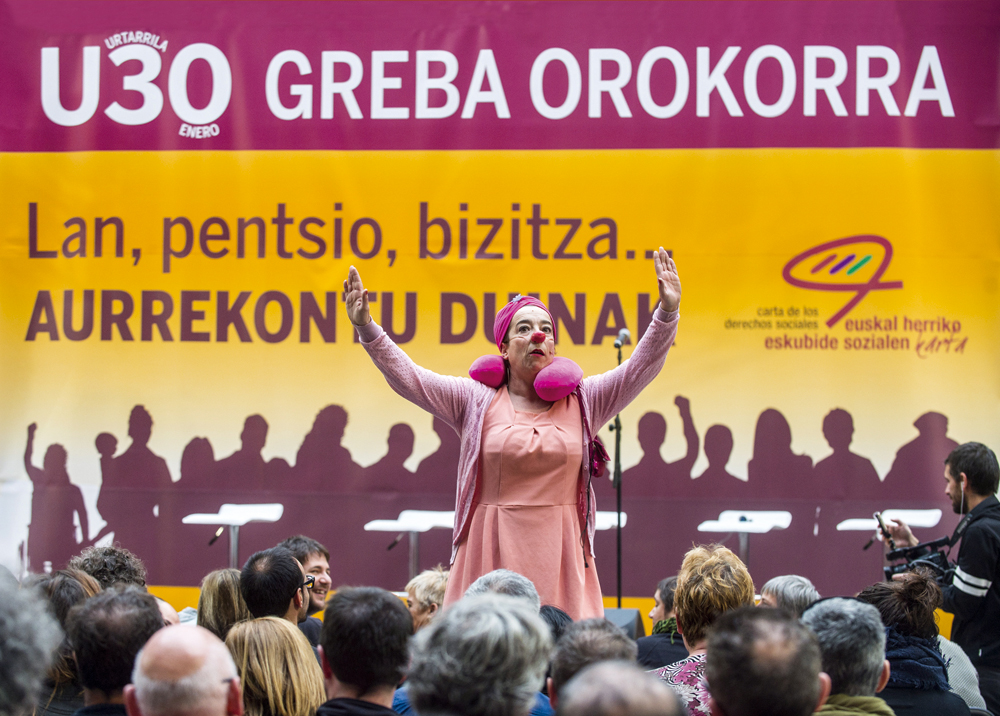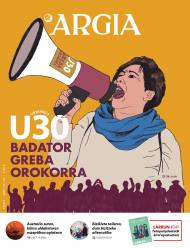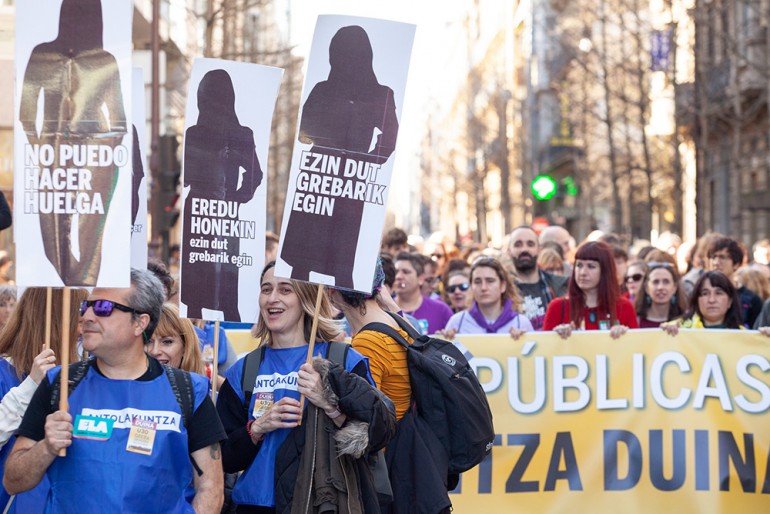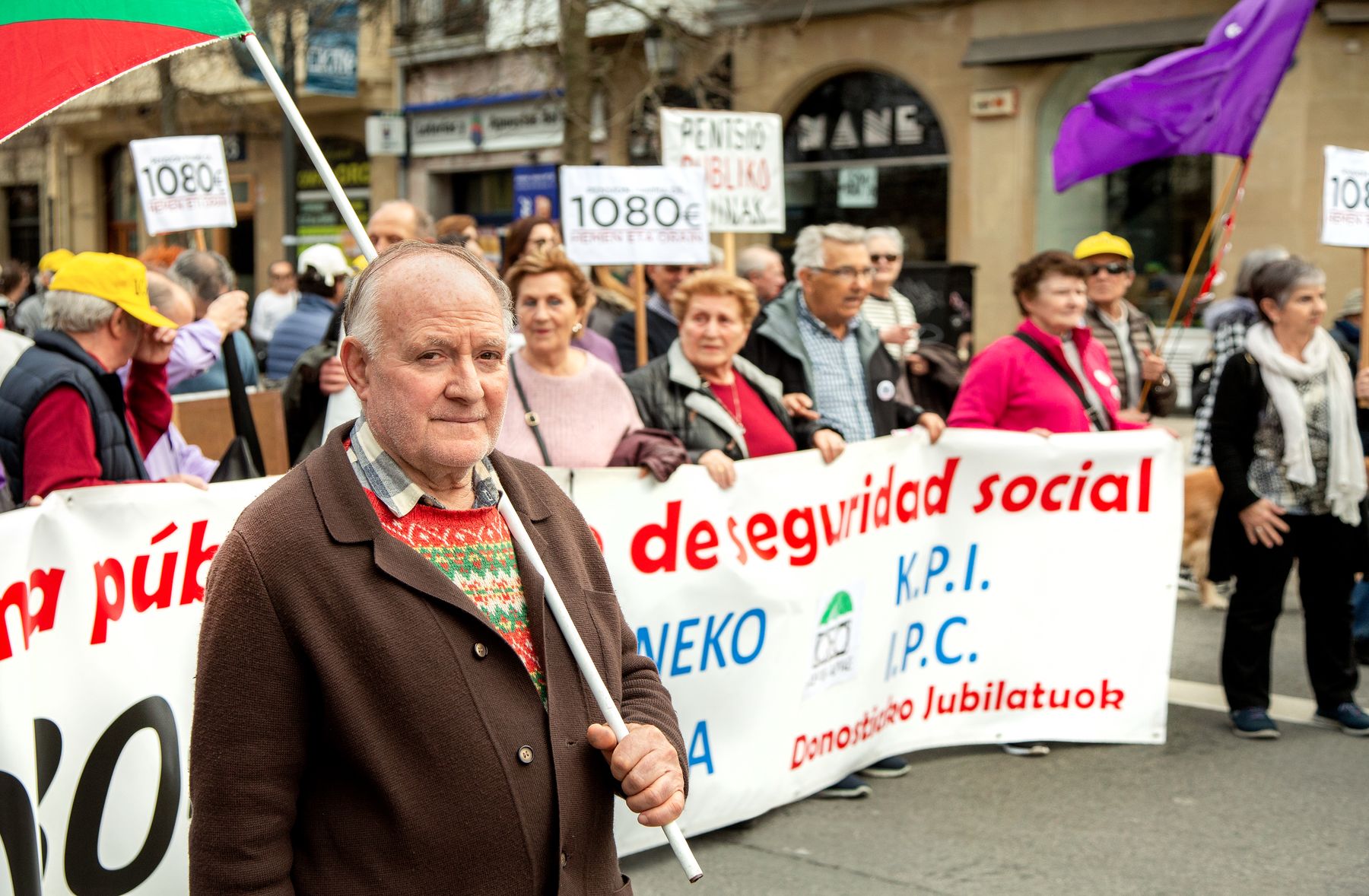Answer on the street
- The Charter of Social Rights of the Basque Country called for a general strike on 30 January in the four provinces of Hegoalde in favour of employment, pension and dignified life. The “great mobilization” that demanded broad groups that constantly strive to recover what had been taken away from them in recent years. If it's the end or the beginning of a tour, the street will tell you.

The number of people living in real poverty has increased by 46% in a decade in Álava, Bizkaia and Gipuzkoa, according to the latest survey by the Basque Government, which in Navarre has been alleviated in recent years, but due to the increase in dependence, according to the Network against Poverty and Social Exclusion. In this decade, governments have been cutting back and reforming their policies, plunged into the economic crisis, and the upper classes have once again flouted the lower classes.
Josep Stiglitz, the Nobel Prize for Economics, explained how neoliberalism has touched us the flute in the last forty years, saying that enriching the top will also benefit the bottom, “but in the meantime, workers should be satisfied with lower wages and citizens should accept cuts.” This policy has brought thousands of people into poverty and precariousness. They've made us swallow the toad of living above our possibilities, but more and more people are there because money, and well-being, is always swimming in the opposite direction.
In Euskal Herria, the Charter of Social Rights of Euskal Herria (EHESK), which brings together dozens of social agents and trade unions, called for a general strike to make a “qualitative leap” on 30 January in response to the demand made by the pensioners’ movement. With the beginning of the Great Recession in 2008, numerous general strikes against cuts were carried out; this reactive struggle was necessary. So now there are some who are not used to this kind of skins. Basque Government spokesman Josu Erkoreka said that “we respect it, but there are no objective reasons for a general strike.”
.jpg)
On the contrary, EHESK has launched a specific platform of claims, and through its reading it is clear how much the lower class has been taken away and how much money there is to be earned, starting with a minimum pension of €1,080. Application of territorial labor agreements, elimination of wage gap, dignification of care tasks, minimum wage gain of 1,200 euros, elimination of precarious formulas and partial days, work day of 35 hours… Behind each of these demands there are many movements, but all of them are class be(es).
The U30 strike has a huge challenge of merging everyone and, above all, of clarifying the strategy from the next day. According to Argentine thinker Diego Sztulwark, neoliberalism is intolerant of any way of life that does not involve the accumulation of capital and the phenomena of “automation of routes of cooperation”. They are symptoms of their structural crisis and they abhor these subjectivities: “That is the basis for the conversion of neoliberalism into a neo-fascist.” In this sensitive trench, the struggle to understand politics in another direction will be played.
With the beginning of the Great Recession in 2008, numerous general strikes against cuts were carried out; this reactive struggle was necessary. So now there are some who are not used to this kind of skins.
Full-time pensioners
After 450 kilometres of asphalt, almost a month earlier the column of retirees who left Bilbao touched in Madrid on 15 October. They took to the streets for the first time in the beginning of 2018, and 105 Mondays have been concentrated in front of the city councils. The Hego Euskal Herria pensioner movement is at the forefront of the Spanish State’s mobilizations.
Following the general strike of U30, its momentum is also noted, although officially it is a strike called by the Basque unions (ELA, LAB, ESK, Steilas, Etxalde, EHNE and Hiru). CCOO and UGT have not joined the strike and have accused callers of "splitting" the movement of pensioners. There are also pensioners who have not supported the strike because “the strike is a matter for the workers”, said Coespe, the state coordinator in defence of the public pension system. “This argument can be used by a retired entrepreneur – the Cobas union has responded – but never by those of us who have been active workers.”

In Euskal Herria, the position in favour of the strike is strong among very broad sectors of the movement, as thousands of people screamed at the parliament in Gasteiz on 12 December. The spokesman for the Bizkaia pensioners' movement, Jon Fano, explained that this is not a labour strike, but a "social and transversal" strike.
And intergenerational. In addition to what concerns them, they are more concerned about what will be left to future generations. Hence the main requirements: increase in pensions according to the CPI, minimum of EUR 1,080, end of the gender gap, elimination of the own public system, sustainability factor…
A woman working in Altos Hornos de Vizcaya, who receives a pension that does not reach EUR 700 a month, and who fights for the future of her children. This could be one of the profiles of those who today form the pensioners’ movement. But it's very varied, and that's where its strength lies.

In the meantime, the Spanish Government has committed itself to raising pensions by 0.9% – some crumbs in the face of increased life – but the issue has been involved in the investiture of the new Executive, which has made retirees more angry. On the other side of the Bidasoa, protests against the reform of Emmanuel Macron’s reserves go much longer and much harder, and this has managed to give way in part. We will have to see how these variables influence the forthcoming mobilizations.
“The strike will be feminist”
The call for the U30 has not only been supported by pensioners, but has also been supported by many others. For example, young people and students who have been hit particularly hard by the crisis. In the atrium of the feminist space Talka de Vitoria, evicted by the police, numerous youth and student organizations of Euskal Herria (Eragin, Network of Precarious Youth, Euskal Herriko Neskas* Gazteak, Ikasle Sindikatua, Gora Ikasleen Borroka…) held a joint hearing. As they have explained, today's young people "have been taken away from the achievements that have been achieved in the past" and have been pushed into precariousness. They have also created a self-demanding table, calling for inclusive and feminist education, or measures to ensure that leisure does not commute with play.
The feminist movement has also joined the U30 quote and to this end they want to take advantage of the networks that have been key to the success of the March 8 general strikes and their “force, mobilizing and transforming capacity”. They have called on trade unions to endorse their demands for precariousness, heteronorma, machismo and life without war.

Even before the strike
Undoubtedly, the support for the movements that in recent years have carried out the strongest and most massive mobilizations in Euskal Herria, feminists and pensioners, will give a great boost to the general strike of 30 January.
But the forms of organization and the previous work carried out in the peoples will also give weight to the day. “If the dynamic is built outside the assemblies of the polygons, the collectives, the plazas and the roundabouts, it is difficult for it to be a general strike, even if it is called so,” says the opinion expressed in the January issue of Hor Dago.
The strike of 5 December against the policies of Macron and its successors has been extremely effective thanks to a long preamble – on a day when 1.8 million people were mobilised throughout the French State, 10,000 in Baiona – among other things, there is the involvement of journalists from the public radio Radio France or agents from neighbourhoods and lycées. Isn’t there a downstream to the south of the border?

It can be quickly seen that strike commissions have been set up in Oñati, Arrasate, Leioa, Aiaraldea, Intxaurrondo and Amara de San Sebastián, Santutxu, Portugalete, Busturialdea, Lea-Artibai, Olarizu de Vitoria-Gasteiz…; numerous talks and round tables are being mobilized; the feminist movement has taken place You'll see the replica and the replicas provoked by this tremor that shakes the palace from the ground to the ceiling.
You'll see the replica and the replicas provoked by this tremor that shakes the palace from the ground to the ceiling.
On 27 December last, several naked people settled in front of the headquarters of the Basque Government in Bilbao, called by the Charter of Social Rights of Euskal Herria, among which were members of the platform against social exclusion Berri Otxoak de Barakaldo. On the same day, the CAV budgets for 2020 were approved in the Basque Parliament as a result of the abstention of Elkarrekin-Podemos: “Our biggest concern is the change of attitude of Podemos, that has been the only difference in these budgets,” said one of the concentrates.
They denounce that the items agreed by the Purple Party with the Urkullu Executive are “restrictive”. In the IGR, for example, Elkarrekin-Podemos has announced an increase of 4%, but the anti-exclusion platform Argilan and other social groups in Bizkaia have explained that the cutbacks that have occurred since 2012 represent a real decrease of 34% for each family that needs this income: “There are enough reasons to be here today and in a month’s time, on the general strike on January 30, on the street.”
The street as a meter; the street more than as a place of empty parades, understood as an assault space; the street for the citizen to become owner in all the grounds; what is wanted to be left in the shade in the kitchen, in the scaffold, in the cashiers to make the street visible.
M21 (2009/05/21)
Enpleguaren alde, krisi garaiko lehen greba orokorra ELA, LAB eta beste hainbat sindikatuk deituta. Confebaskek “erabateko porrota” izan zela adierazi zuen, sindikatuek berriz %50eko jarraipena izan zuela. Teknologia berriak erabili ziren lehen aldiz, Grebaorokorra.com webgunearen bidez.
E29 (2010/06/29)
Jose Luis Rodriguez Zapateroren lan-erreformaren kontra, hau indarrean jarri aurretik. Sindikatu estatalistek eta Euskal Herrikoek bananduta deitu zuten.
I29 (2010/09/29)
Hiru hilabetean bigarren greba lan-erreformaren kontra, CCOO eta UGTk deituta. Apenas izan zuen eraginik, Nafarroan izan ezik.
U27 (2011/01/27)
Jubilazio adina 65 urtetik 67ra atzeratzeko saiakera egin zuen PSOEren gobernuak. Euskal gehiengo sindikalak deitu zuen eta industrian %60ko jarraipena izan zuen. Istiluak Bilbon eta Gasteizen.
M29 (2012/03/29)
Mariano Rajoyk lan-erreforma onartu ondoren deitua, azken urteetako indartsuena izan zen, erreforma “basatienaren” aurka, milaka langile kaleratzeko ateak ireki baitzizkien enpresei. Patronalak berak onartu zuen grebaren arrakasta.
I26 (2012/09/26)
Eragile sozialek Espainiako Gobernuaren murrizketen kontra egina, honek bankuen erreskateak 100.000 miloi euro kostako zuela aitortu ostean.
A14 (2012/11/14)
CCOO, UGT eta beste sindikatu batzuen sostenguarekin, murrizketen kontra deitua, Europa mailako mobilizazio egunaren barruan.
M30 (2013/05/30)
Gehiengo sindikalak eredu propio bat eskatuz deitua, sektore publikoan jarraipen zabala izan zuen.
M8 (2018-19/03/08)
Azken bi urteetan mugimendu feministak greba orokor arrakastatsuak egin ditu martxoaren 8an. Manifestazio masiboak egin dira, “bizitza erdigunean” jartzeko eskatuz.
2008an, finantzen krisia mundua astintzen hasi zenean, grebari buruzko tesiak zirkulatzen hasi ziren Frantziako Estatuan, Desmobilizazio Institutuak sorturik. Rennes-en lehenik, eta ondoren Parisen, Thèses sur le concept de grève (Greba kontzeptuaz tesiak) liburua kaleratu zen –gaztelaniaz ere aurkituko du Hegoaldeko irakurleak, Artefaktek argitaraturik–. Grebaren esanahiaz hausnartzeko balio dute tesi horiek. Hemen batzuk:
Greba normaltasuna da
“Reichek dioen bezala, harrigarriena ez da jendeak lapurtzea eta greba egitea, baizik eta gose daudenek ez beti lapurtzea eta esplotaturik daudenak beti greban ez egotea”.
Greba benetako festa da
“Grebak, festak bezala azenturik gabeko fase hori eteten du, lan egiteko denborarena”.
Greba demokrazia da
“Politikaren despolitizazioaren kontra borrokatzen du grebak, publikoa pribatizatzearen kontra”.
Greba ezinezkoa asmatzea da
“Amildegira jauzi egitea da. Grebak hasieran oraindik ez daki, ezin du jakin, zer nahi duen ere”
Greba poztasuna da
“Erabat aspertzeak eta poztasuna desagertzeak, esan nahiko luke grebak errealitatea galdu duela”.
Hego Euskal Herrian arrazoi soziolaboralak edo politikoak direla medio, greba orokor bat deitzeak bere jarduera guztia geldiaraztea bilatzen du. Batzuentzat urtarrilaren 30eko greba orokorra arrakastatsua izan da, eta beste batzuentzat porrota, bakoitzaren betaurrekoen arabera.
Urtarrilaren 30eko Greba Orokorraren biharamunean, grebak suposatu duenaren inguruan hausnartzeko tartea hartu dugu Sonia Gonzalezekin.
























